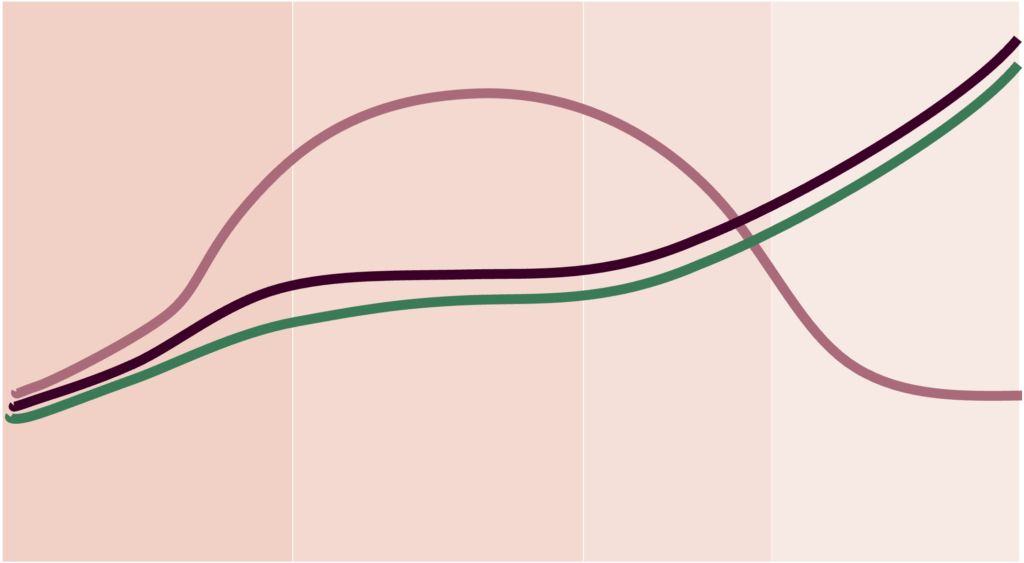Snapshot
Estrogen’s decline during menopause brings significant changes to our bodies.
Estrogen plays a crucial role throughout our lives, and its fluctuating levels during menopause brings significant changes to our bodies. These changes can bring about a range of physical and emotional symptoms, including hot flashes, night sweats, mood swings, vaginal dryness, and changes in bone density. These symptoms can vary in intensity from person to person. From lifestyle adjustments to seeking professional guidance, there are ways to ease the transition and maintain your well-being.

First off, what’s happening and why?
As women approach menopause, typically in their late 40s to early 50s, the production of estrogen by our ovaries begins to decline. Estrogen is a key hormone responsible for regulating our menstrual cycle, maintaining bone density, and keeping skin elastic, among other functions. During perimenopause (the years leading up to menopause), estrogen levels can fluctuate unpredictably, leading to symptoms like irregular periods, hot flashes, and mood swings. Once menopause is reached—defined as 12 consecutive months without a period—estrogen levels stabilize at a lower level, marking the end of the reproductive years.
Research tells us...
Scientific studies have shown that the decline in estrogen during menopause is linked to a variety of health changes, including increased risk of osteoporosis and cardiovascular disease. Studies highlight that postmenopausal women are at a higher risk of heart disease due to the protective effects of estrogen on the cardiovascular system waning. Research also suggests that lifestyle factors, such as maintaining a healthy weight and engaging in regular physical activity, can significantly reduce the risk of osteoporosis and heart disease during and after menopause.
What happens at the different stages of menopause?
Perimenopause: This phase can last anywhere from a few months to several years. Estrogen levels fluctuate, causing irregular periods, mood changes, and other symptoms like sleep disturbances. This is also when many of us start experiencing hot flashes and night sweats.
Menopause: Once our periods have stopped for a full year, we are considered menopausal. Estrogen levels are now much lower, which can bring new challenges like vaginal dryness, decreased libido, and an increased risk of heart disease and osteoporosis.
Postmenopause: After menopause, our estrogen levels remain low, and the risk of long-term health issues, particularly those related to bone density and heart health, increases. However, postmenopause is also a time when many of the disruptive symptoms of perimenopause and menopause start to subside.
It’s never too early to start supporting our bodies. In our 30s and 40s, regular weight-bearing exercises like walking, running, or strength training can help maintain bone density. A balanced diet rich in calcium, vitamin D, and omega-3 fatty acids is also crucial for supporting bone and heart health. Additionally, mindfulness practices and stress management techniques can improve mental well-being, which is particularly important as hormonal fluctuations start to impact mood.
So, what can we do about it?
Managing the effects of declining estrogen involves a combination of lifestyle changes and, for some, medical interventions. Regular exercise, a balanced diet rich in calcium and vitamin D, and stress management techniques like yoga or meditation can help mitigate symptoms. Some women may benefit from hormone replacement therapy (HRT), which can alleviate severe symptoms by supplementing the body’s estrogen levels. It’s important to consult with a healthcare provider to discuss the risks and benefits of HRT based on your individual health profile.
Estrogen SOS: when to seek help
While some of us may navigate menopause with manageable symptoms, others may experience more severe effects that impact daily life. It’s important to seek help if your symptoms are affecting your quality of life. Persistent hot flashes, severe mood swings, anxiety or unexplained changes in your health should be discussed with a healthcare provider. Additionally, if you’re considering hormone replacement therapy, a professional can guide you through the options and help you make an informed decision.
Additionally, if there is a family history of osteoporosis or heart disease, it’s wise to discuss preventive measures with a doctor early on to protect long-term health.
Anything else?
Staying informed and proactive about your health during menopause is key. Regular check-ups with your healthcare provider, keeping track of your symptoms, and discussing any concerns you have are important steps. Additionally, staying connected with a community, whether online or in-person, can provide support and valuable insights from others going through similar experiences.
Toolkit for estrogen support
Calcium and vitamin D supplements: These are essential for bone health, especially as estrogen levels decline.
Phytoestrogen-rich foods: Foods like soy, flaxseeds, and chickpeas can provide plant-based estrogens that may help balance hormone levels.
Moisturizers and lubricants: As estrogen levels drop, vaginal dryness can occur. Over-the-counter products can help alleviate discomfort.
Hormone Replacement Therapy (HRT): Consult with your healthcare provider about whether HRT is right for you.
Cooling bed linens: Night sweats can disrupt sleep, so breathable and moisture-wicking linens may provide relief.
More on the role of estrogen
These are some of the key aspects of the role of estrogen in menopause:
- Reproductive function: Estrogen is a female sex hormone produced primarily by the ovaries. It plays a critical role in regulating the menstrual cycle and supporting fertility. During menopause, the ovaries gradually reduce their production of estrogen, leading to irregular menstrual cycles and, eventually, the cessation of menstruation.
- Symptoms: The decline in estrogen levels during menopause is associated with a range of physical and emotional symptoms, including hot flashes, night sweats, mood swings, vaginal dryness, and changes in bone density. These symptoms can vary in intensity from person to person.
- Bone health: Estrogen helps maintain bone density by promoting the activity of osteoblasts, cells responsible for bone formation. Reduced estrogen levels in menopause can lead to bone loss and an increased risk of osteoporosis, a condition characterized by fragile and brittle bones.
- Cardiovascular health: Estrogen also has a protective effect on the cardiovascular system, helping to maintain healthy blood vessels and reduce the risk of heart disease. The decline in estrogen during menopause may contribute to an increased risk of heart-related issues in some women.
- Cognitive function: Some research suggests that estrogen may play a role in cognitive function and memory. Changes in estrogen levels during menopause may contribute to cognitive changes in some individuals, although more research is needed to fully understand this relationship.
- Skin and hair: Estrogen can affect skin elasticity and hydration, as well as hair thickness and texture. Changes in estrogen levels may lead to changes in skin and hair quality during menopause.
- Genitourinary health: Estrogen helps maintain the health of the vaginal and urinary tissues. Reduced estrogen levels can result in vaginal dryness, discomfort during intercourse, and an increased risk of urinary tract infections.


















